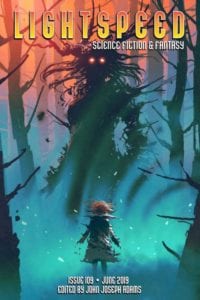I admittedly have a complicated, selfish relationship with short fiction. I’ve always enjoyed it. As an avid reader, the idea of being able to lose myself in a world and enjoy great fiction without the commitment of a book proper has always appealed to me. So much, in fact, that when I began my own tentative forays into writing, it was into writing and submitting short fiction.
With this came a selfish frustration as my efforts failed. Frustration because I know I’m a talented writer and I have received a lot of positive feedback on my writing in the past. I couldn’t help but grow a little bit resentful when I found my efforts rebuked time and time again. Looking back on it now, it is glaringly obvious why.
I failed because of my tentativeness.
Arguably more than any other kind of fiction writing, short fiction requires an author to really invest something of themselves in their story. To reveal some truth of their lives, their thoughts, fears, and experiences that make your writing feel meaningful and impactful. With such limited space to make a world and characters feel real, you need to place a piece of yourself in it that stands out. Many people struggle to admit truths about themselves just in their every private life, let alone in something you aim to have many people read.
You also need to have the skill to turn all this into an engaging story with something to say of course, but possibly the hardest hurdle is simply finding something to say when you sit down to write a story. If you can’t, you’ll probably be passed over by those who did find something to say.
I have two stories to cover today, each in their own way exemplifying how we each give of ourselves to tell stories worth telling.

“Revival,” by Lisa Bradley
At its heart, “Revival” is a story of love and faith. The protagonist, a young woman named Carmen, visits a traveling preacher to heal her acne scarring, and meets a stranger named Swift. The two gradually grow close until the mysteries of Swift’s nature and past reveal themselves. Woven within this love story are themes of faith, death, and slavery.
What made it stand out to me was the sheer authenticity poured into every paragraph. Lisa Bradley’s biography describes her as a queer Tejana raised Texas-Mexico border. Every second of the story screams of this experience. She wraps you in her story’s setting and does everything she can to transport you to a place and time vivid and real, to make it instantly recognizable to anyone who has experienced the same.
She accomplishes this with efforts both minor and major. Small things like the inclusion of the odd Spanish phrase, familiar to anyone who has been around a Latino community and recognizes the effortless combination of Spanish and English, serve as the type of minor details which weave together to create a larger picture of familiarity and experience, of having grown up in a place like this and knowing it intimately.
“She hurries to Mami’s casita, fearing her lover might be sick in bed, but only echoes answer when, forehead damp from hurried ablutions, she calls his name in empty rooms. Perhaps he went into the forest to gather nopalitos for his secret breakfast. And stepped on a copperhead? Or startled a javelina protecting babes?”
It seems minor, and the full effect is hard to relate in any single picked quote. The full effect is powerful. The detail of the clothes worn, the scars adorning skin, the food eaten, it all blends together into a potent, realized world. “Revival” sticks with me for accomplishing that most difficult of tasks in speculative short fiction, the task of creating a believable place for the reader to lose themselves in. Bradley accomplishes this with aplomb. She knows this place, has lived this placed. It is a piece of her she has thankfully offered to the readers.
The story itself is also well told, as Carmen gradually develops from the panicked tentativeness of her initial steps into the preacher’s tent to the climax, where her own form of faith drives off an evil which once enslaved Swift and threatens to do so again. Through love, she finds the answer she sought in the tent, and a form of belief satisfying for the life she leads. I can’t help but wonder if this also relates back to Lisa Bradley’s identity as a queer woman. Heteronormativity often creates a difficult, complicated relationship between members of the LGBTQ community and their faith.
And yet this is also an experience known to many of religious belief, regardless of what your religious belief is. The role of faith in a person’s life is a uniquely singular experience, yet one we all recognize. Each of us makes peace with our faith, or lack thereof, in our own distinct way.
Carmen makes this journey in remarkably-paced fashion, coming to terms with her own beliefs and ideas through her budding relationship with Swift. She spends much of the story refusing faith, even as she seeks it out time and again.
“What other laws exist? she almost asks, before remembering he’s religious and she—despite the mind-stretching events under the preacher’s tent—is not. Two and a half decades lived by logic and proof easily outweigh a handful of healings. Flukes.”
The resolution feels well-earned. Carmen reaches a believable place in her own fashion, one she earned.
“Revival” is a journey we can all recognize, even if we can’t relate to every detail. In the end, whatever the setting, whatever our cultural experiences, this battle of faith and love and genuine human connection is one that crosses all cultural barriers when done right. Lisa Bradley does it right and gave a piece of herself to make it happen.

“The Harvest of a Half-Known Life,” by G.V. Anderson
Where “Revival” offers a potentially biographical idea of how an author puts something of themselves in a story, “The Harvest of a Half-Known Life” is far more literal. If I may quote:
“The skin for my mother’s book was taken from her stomach. That scar marked the cut I was born from, when the natural way grew too difficult.”
This story takes place in a meager, apocalyptic world where the remains of the dead are harvested for use by their communities. It focuses on a woman named Gwinaelle, who lives as a scavenger in the ruins outside of a village. A year has passed since her mother’s death. Gwinaelle struggles with her final words, what they mean, who exactly her mother is, and what direction she desires for her life.
As you’d probably guess from that little synopsis, much of the story focuses on Gwinaelle’s grief, especially when she comes across the corpse of one of her mother’s closest friends. The people of this world place great emphasis on the writing of books throughout one’s life as a detailing of their life’s knowledge to pass on to the future. When Gwinaelle finds Yba’s “book,” a single page, it renews familiar feelings that she did not know her mother or Yba, the two most important people in her life.
Gwinaelle struggles not only to understand them but herself. She returns to the village with the harvest from Yba’s body and the single page of her book, where another of her mother’s friends and her fiancé wait. They pressure her to stay in the village and stop scavenging the ruins. Gwinaelle must reconcile her relationship with them vs. her desire to fulfill her mother’s dying words.
This story provides a much more literal interpretation of what a person must give of themselves in order to contribute. It features a society focused entirely on what we give of ourselves in order to benefit others. Not until Gwinaelle decides for herself what she wants from her life does she make the decision to start her own book. She must come to grips with what she wants from her life, what her contribution is, what it is she wants to say to the world. She can only do this by coming to grips with what those most important to her had to say.
“I can imagine all I like, but I’ll never truly know my mother’s mind. Her book, my fading memories, the taste of her marrow are half-truths and they’re all I have, all I’ll ever have—without her, I can only interpret them as best I can.”
With “The Harvest of a Half-Known Life,” G.V. Anderson tells a vividly literal story of disassembling a life in search of understanding and ideals. I found it a rewarding story that hit at some truths I’ve struggled to find myself.
Next Short Fiction Friday: Katie returns with more stories for us!

